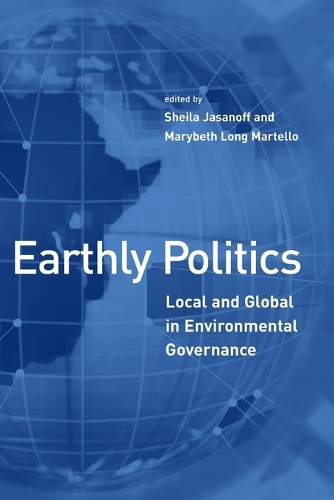
Earthly Politics: Local and Global in Environmental Governance
(Paperback)
Publishing Details
Earthly Politics: Local and Global in Environmental Governance
By (Author) Sheila Jasanoff
Edited by Marybeth Martello
MIT Press Ltd
MIT Press
19th March 2004
United States
Classifications
Professional and Scholarly
Non Fiction
Environmentalist thought and ideology
Political science and theory
333.72
Physical Properties
Paperback
376
Width 152mm, Height 229mm, Spine 18mm
499g
Description
Globalisation today is as much a problem for international harmony as it is a necessary condition of living together on our planet. Increasing interconnectedness in ecology, economy, technology, and politics has brought nations and societies into ever closer contact, creating acute demands for co-operation. Earthly Politics argues that in the coming decades global governance will have to accommodate differences even as it obliterates distance, and will have to respect many aspects of the local while developing institutions that transcend localism. This book analyses a variety of environmental-governance approaches that balance the local and the global in order to encourage new, more flexible frameworks of global governance. On the theoretical level, it draws on insights from the field of science and technology studies to enrich our understanding of environmental-development politics. On the pragmatic level, it discusses the design of institutions and processes to address problems of environmental governance that increasingly refuse to remain within national boundaries. The cases in the book display the crucial relationship between knowledge and power.
Reviews
"O'Rourke shows that even in the context of a poor market-socialist country whose state places the highest priority on attracting foreign investment in manufacturing, community-driven regulation can be surprisingly effective in reducing pollution and other forms of environmental degradation. Another important conclusion of his study that is relevant to both North and South is the critical role that citizen access to information on pollution emission standards and on how local firms compare to others across the country plays in such regulation."--Frederick H. Buttel, William H. Sewell Professor of Rural Sociology and Professor of Environmental Studies, University of Wisconsin, Madison "Pellow employs the notion of the 'treadmill of production' along with theoretical insights from race and ethnic studies to reveal the contradictions and complexities of the urban recycling and waste management economy. With the publication of Garbage Wars, David Pellow has established himself as one of foremost theorists and researchers on environmental inequalities and environmental justice."--Frederick H. Buttel, William H. Sewell Professor of Rural Sociology and Professor of Environmental Studies, University of Wisconsin, Madison
Author Bio
Sheila Jasanoff is Pforzheimer Professor of Science and Technology Studies at Harvard University's Kennedy School of Government. She is the author of Designs on Nature- Science and Democracy in Europe and the United States and other books and the coeditor of Earthly Politics- Local and Global in Environmental Governance (MIT Press, 2004).
